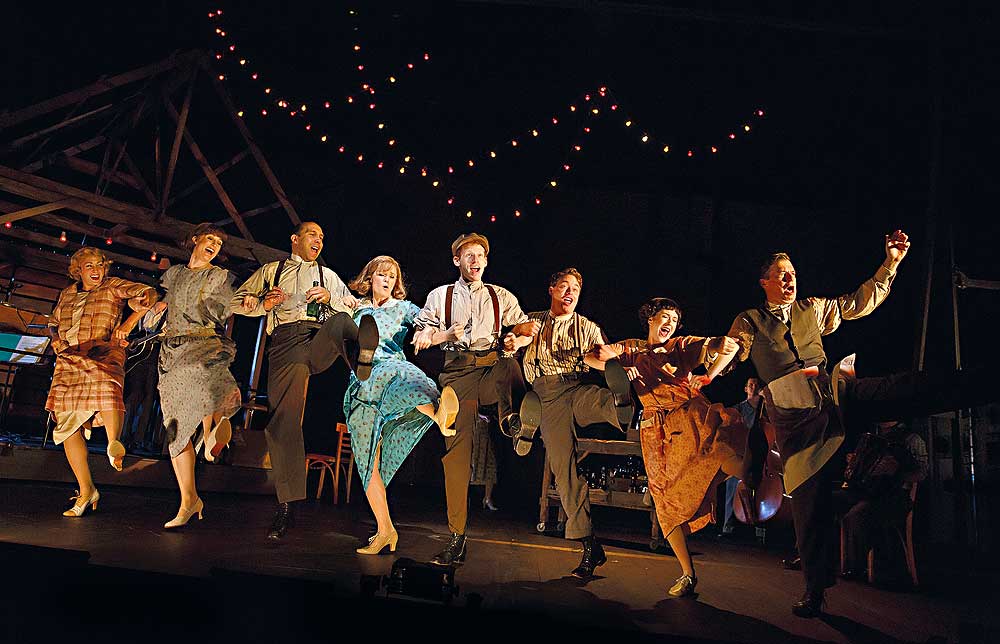NEW YORK CITY: Today’s 16-Tony nomination sweep for Hamilton may count as the least surprising New York win since Donald Trump blew out the Republican state primary in April. But there’s another less-heralded element of each year’s Broadway awards season that should surprise no one who’s paying attention: Nearly all the shows celebrating their nominations today (not to mention every nominated artist) got their start in nonprofit houses, either domestic or foreign, up to and including the Public Theater-birthed, New York Stage and Film-workshopped Hamilton.
Whether you think the intertwining of nonprofit and commercial theatres is a good or a bad thing (we’ve covered it from a variety of angles over the years, most recently here), it’s a fact that not only have the nation’s nonprofit theatres effectively become an out-of-town tryout system for Broadway’s commercial houses—there are three nonprofit theatres actively producing Tony-eligible shows for Broadway (and one more in the wings). The biggest of them, Roundabout, is represented by no fewer than four shows in today’s nominations, all revivals: She Loves Me, Long Day’s Journey Into Night, Noises Off, and Thérèse Raquin. (New-play nominee The Humans, though it had its New York debut at one of Roundabout’s Off-Broadway spaces after premiering at Chicago’s American Theater Company , is in a commercial run.) And Manhattan Theatre Club is represented in the new-play category with Florian Zeller’s The Father.
This year’s crop of new musicals, apart from the 10-dollar-founding-father juggernaut, include two relative rarities: shows that have opened “cold” on Broadway, without the benefit of an out-of-town tryout, nonprofit or otherwise. These include the Andrew Lloyd Webber/Julian Fellowes musical School of Rock and the George C. Wolfe/Savion Glover not-quite-revival of Shuffle Along. But the remaining nominees—the Sara Bareilles/Jessie Nelson-penned Waitress and the Steve Martin/Edie Brickell tuner Bright Star—bowed at American Repertory Theater, and the Old Globe and Kennedy Center, respectively.
The new-play category has nonprofit fingerprints all over it, if not outright producer credits. Apart from MTC’s The Father and Stephen Karam’s The Humans, in a production that’s essentially a transfer of its Roundabout staging, there is Danai Gurira‘s Eclipsed, which like Hamilton comes directly from the Public after first being developed at McCarter Theatre for its 2009 premiere at D.C.’s Woolly Mammoth (it has also been staged by Yale Rep and Center Theatre Group ), and Mike Bartlett’s King Charles III, which represents another prominent brand of nonprofit-to-Broadway import: K3 had its debut at London’s Almeida Theatre.
A British pedigree is also behind John Doyle’s nominated revival of The Color Purple, which kicked off at London’s Menier Chocolate Factory (though the 2005 musical was birthed, of course, at Atlanta’s Alliance Theatre). The musical revival nominees include one commercial only-on-Broadway offering, Bartlett Sher’s staging of Fiddler on the Roof (even as his revival of The King and I continues at Broadway’s third nonprofit, Lincoln Center Theater), while the remaining two are the aforementioned Roundabout She Loves Me and Spring Awakening, which gets extra credit for originating at a 99-seat nonprofit, Los Angeles’s Deaf West Theatre Company.
The new-play revival category includes one Brit import, the Young Vic staging of Arthur Miller’s A View From the Bridge, as well as two outright commercial productions: Miller’s The Crucible and David Harrower’s Blackbird, though the latter staging is based on a previous staging at Manhattan Theatre Club and has the same director, Joe Mantello, and one of its stars, Jeff Daniels. The others are Roundabout’s Noises Off and Long Day’s Journey Into Night.
It may be instructive, though, that director Ivo van Hove, who helmed both the Miller revivals in what constitute his first forays on Broadway, previously developed his unique aesthetic exclusively at a Dutch nonprofit, Toneelgroep Amsterdam, and has been most active in the U.S. at the East Village’s New York Theatre Workshop. Clearly, though money makes the world go ’round on Broadway, much of the world’s best theatre—even the shows that eventually turn a profit—is still developed outside the for-profit world.


